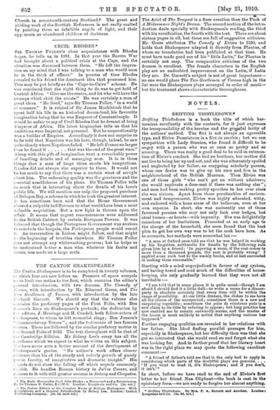CECIL RHODES.*
Bra THOMAS FULLER'S close acquaintance with Rhodes began, he tells us, in 1881. In that year the Basuto War had brought about a political crisis at the Cape, and the situation was discussed between them. "He left the impres- sion on my mind that I was talking to a man who would soon be in the thick of affairs." In process of time Rhodes revealed to his friend the dominant idea that possessed him. This may be put briefly as the " Cape-to-Cairo " scheme. He was convinced that the right thing to do was to get hold of Central Africa. " Give me the centre, and let who will have the swamps which skirt the coasts." He was certainly a man of great ideas. "He lived," says Sir Thomas Fuller, "in a world of romance." It is related of Sir James Mackintosh that he spent half his life in an historical dream-land, his favourite imagination being that he was Emperor of Constantinople. It would be unfair to say of Cecil Rhodes that he dreamt of being Emperor of Africa. His latest biographer tells us that his ambitions were Imperial, not personal. But he unquestionably was a builder of Empires. Accordingly it does not surprise us to be told that Napoleon was his hero, though, indeed, he saw quite clearly where Napoleon failed. "He le ft France no larger Clan he found it that was the end of the great wars." Along with this gift of imagination went a remarkable power of handling details and of managing men. It is in these things that a man of large ideas meets his temptations. Rhodes did not always rise superior to them. It would not be too much to say that there was a certain want of scruple about him. The redeeming quality was the greatness and the essential unselfishness of his plans. Sir Thomas Fuller tells us much that is interesting about the details of his hero's public life. We will mention one only, the proposed purchase of Delagoa Bay, a scheme in which he took the greatest interest. It has sometimes been said that the Home Government showed a culpable indifference to what would have been a most valuable acquisition. But a new light is thrown upon the affair. It seems that urgent remonstrances were addressed to the British Cabinet by certain European Powers. It was hollered that though the Portuguese Government was anxious to conclude the bargain, the Portuguese people would resent it. An insurrection in Lisbon might follow, and that might ha the beginning of troubles elsewhere. Sir Thomas Fuller does not attempt any whitewashing process ; but he helps us to understand better a man who, whatever his faults and errors, was made on a large scale.






































 Previous page
Previous page